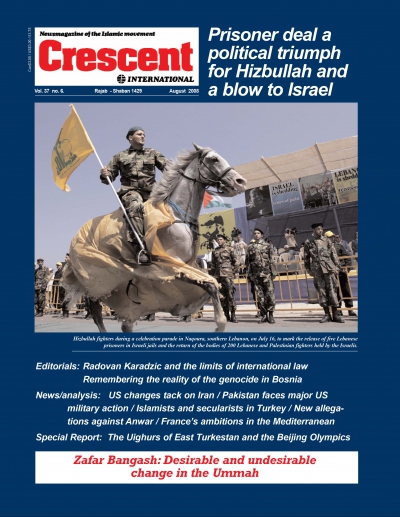Crescent International Vol. 37, No. 6
Newsmagazine of the Islamic movement
Iqbal Siddiqui
Rajab, 1429 2008-08


During the first months of 2006, Shaikh Hasan Nasrallah, the leader of Hizbullah, and Ehud Olmert, the prime minister of Israel, both set out clear goals for their people. After the withdrawal from Ghazzah the previous year, Olmert promised a solution to the problem of Hizbullah on Israel’s northern border, and Israeli and US military officials held a series of meetings in Washington and Tel Aviv to draw up plans for a war to destroy Hizbullah

Two months may be too short a time to present an accurate assessment of the impact of Imam Muhammad al-Asi’s tafseer, The Ascendant Qur’an, but the contours of its reception are already clear. Most people have been impressed by its fine production quality, contrasting it with the poor quality of Islamic literature often produced elsewhere in the Muslim world.

During the early 1990s, the war in Bosnia dominated Muslim attention much as a war in Iraq has in the last few years, considering which it is perhaps surprising how little of the events of those years is known to many young Muslims today.

As events in Bosnia unfolded in the early 1990s, in the aftermath of the collapse of the communist bloc in 1989, Muslims were initially surprised to discover the previously little-noticed Muslim population of central Europe, and then shocked by the attempt to exterminate them.

Four years ago Anwar was almost a spent force in Malaysian politics. When he was released after a court’s acquittal in September 2004, amid the jubilation that he would provide the leadership needed for an opposition in disarray, there was still no guarantee that another attack against him would not resurface, despite the failed campaign of prime minister Mahathir Mohamad to taint his character.

Speculation abounds about why, after years of threatening to attack Iran, the US suddenly decided to send William J. Burns, under secretary of state for political affairs, the third-highest-ranking US state department official, to Geneva to attend a meeting with Iran over its nuclear program.

The long-established fault-lines dividing Turkish society are emerging to dominate its politics once again. As on so many occasions in the past, the secular elites are once again up in arms to protect the nation-state that they have dominated for 85 years.

Suspicions that Pakistan is being set up for a major US military operation, probably in the tribal areas in the north-west of the country, have intensified in recent weeks, given added credibility by the endorsement of two retired Pakistani generals known for their keen observation of events in the region.

The summit held in Paris on July 13, hosted by the French president Nicolas Sarkozy to launch the Union for the Mediterranean, was attended by 42 European Union (EU) andMediterranean heads of government, including Hosni Mubarak, the president of Egypt, who co-chaired the summit with Sarkozy.

As the Olympic Games open in Beijing this month, Western activists will do their best to disrupt them in support of Tibetan independence. Less known is the history and struggle of the Uighur Muslims in Chinese-occupied Central Asia. FAHAD ANSARI discusses their plight.

The last few years have been a period of exceptional turbulence in the Muslim world, even by the standards of an Ummah that has become accustomed to the buffets of history during the period of colonialist imperialism. In this extended essay, ZAFAR BANGASH, the Director of the Institute of Contemporary Islamic Thought (ICIT), reflects upon the nature of social change and lessons for Muslims today.
